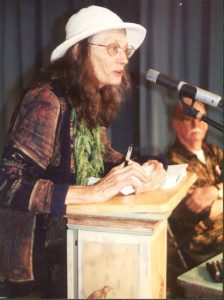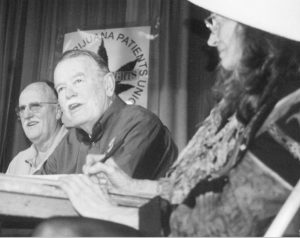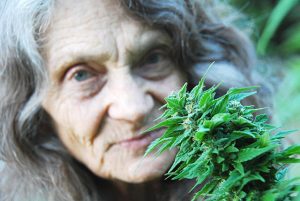“Marijuana is an ancient medicine both spiritual and physical, and adds comfort, equal to any human, in my daily life.” – Sudi “Pebbles” Trippet
What do those of us working in the cannabis industry owe to those who came before us, particularly the advocates and activists who risked their freedom? What debt is due to those who gave so much so that we could work in this space, openly enjoy this plant, and be part of this community? These are questions I have been pondering since my time speaking with Pebbles Trippet.
Now 82 years old, Pebbles’ health is failing. She has COPD from Chronic Bronchitis. I had to wait several days until she felt well enough to speak with me. Each sentence she spoke seemed taxing, and she had to wait to catch her breath. She relies on an oxygen tank when she cannot. Initially, she seems very frail, but the spark in her eyes and spirited fight in her voice, tell the tale of a life spent working for justice and dedicated to others.
An Interview with Cannabis Advocate Pebbles Trippet
Leah Cerri: I’ve read about your legal case and legacy as an advocate but I don’t know a lot about your childhood. Can you tell me about your early years growing up in Tulsa?
Pebbles Tribbet: I came from a very dysfunctional family. I was the oldest of three sisters. I was born during World War II. My father was a lawyer and businessman who became a convicted swindler. Unknown to me, he was amassing millions of dollars by ripping people off in tax shelters. He got away with it for 20 years until they finally caught him. The judge was a law school buddy, so he gave him one day in jail and a fine. He got a really good deal. My mother was a housewife. They were not a good mix. She came from a prominent Tulsa family, and she began drinking early on.
The Intersection of Advocacy
LC: I read that you first became involved in protests against the war in Vietnam. Is that the first issue that mobilized you? Can you share about your civil rights work and how you got involved?
PT: I want to talk about my influences. What made a difference, in terms of my thinking and consciousness? Mainly, I was motivated by the Civil Rights movement, the Emmit Till lynching and the Montgomery Bus Boycott. The 1955 bus boycott in Montgomery Alabama was the biggest influence on me. I was thirteen and I watched it carefully. The bus boycott succeeded by simply staying together and being disciplined as a team. At the time, Black people were basically the only people riding the buses, so when they organized and stopped, you’d only see empty buses driving all around the city. It made me realize, ‘Oh, I see, that’s how you win.’
In High School, I was approached by one of the four African American students at the school who wanted my help with her grade in math class, which I could not help her with but we became friends. I snuck her into the drive-in movie theater in the trunk of my car and then when it was clear, she would sit in the front with me as equals.
In 1960, I became part of a team of activists who integrated The Tulsa Oklahoma lunchrooms, under the leadership of the Oklahoma City NAACP. I just showed up really, but I felt it was the least I could do.
I went to college at the University Of Wisconsin at Madison because I thought it was the most liberal, where I received several administrative violations, for staying out all night, learning how to make love. They kicked me out. I went to the University of Oklahoma and I called an anti-war demonstration. Fifty people showed up and we became a presence on the campus from then on. At some point, a bomb came in my front door, sent by the Minutemen. I was up reading at 3 am. Luckily, it didn’t go off. They weren’t very good at what they did. But it singed the walls and me a little bit, and I decided to move. I wasn’t accomplishing enough there anyway.
I was getting involved in feminism and the anti-war movement, as issues I cared about. There was not a day in the world that I didn’t wake up thinking of the Vietnamese people and their fight. I spent four years in New York working against the war in Vietnam. Eventually, I got tired of New York. It’s cold, emotionally speaking, and I was very friendly. I used to say ‘Good people is my people.’ And New York didn’t care. So I left.
Aside from the anti-war movement and civil rights, music was my other big influence, and it has stayed with me forever. Chuck Berry, Little Richard, and Fats Domino, they were my big 3. I lived under the theme ‘If you want to dance with me, it’s got to be rock n roll music.’ Most of what I cared about were Black people and their struggles.
Shortly after that Rosa Parks refused to give up her seat to a white man and got arrested. I remember her so well. There was a song, “Thank you, sister Rosa, thank you” that was written in her honor by The Neville Brothers. It was a really beautiful song. So that was added to my list of musicians that matter to me, as well as Donovan, Grace Slick, Marvin Gaye, and Joni Mitchell.

LC: How did you first get involved in cannabis advocacy?
PT: I had long dropped out of college to be an activist, and to challenge the marijuana laws. I didn’t get busted for a while, but I was aware of the bad laws and took notice of what I’d learned from the bus boycott, and imagined applying them to this new situation.
Then, I had a good friend named Geb, ‘Sudi and Geb’ were a team, and we were both in the Socialist Workers Party. I had become a socialist and revolutionary. The SWP knew my opposition to the war and their anti-gay policy. Being bisexual, it appealed to me to oppose that openly. I said, “Oh no you don’t.” And they brought me up on charges and kicked us out of the SWP. I had already decided that they were too backwards, those policies, the anti-gay policy, and the anti-weed policy were no good for me, not me! So, I left.
I became a part of the pro-pot movement in 1972. It had just formed. We had gathered 100-200 people, everyone who was amassing on that issue. We wanted to bring a statewide ballot for a vote. It’s very difficult to do, it takes half a million signatures. We made it. We got all the signatures, got it on the ballot, and got 1/3 of the vote, 30 percent. I thought that was fantastic. We had never spoken to the American people about this and they came out with a decent amount of support. I said let’s do it again next year. So we did.
We made it on the ballot again but the Government wouldn’t let us have it. So we didn’t get anywhere on the second try. We were just the people who had decided that weed was our issue. And the people, the American people were our best hope. We put our trust in them, and we were correct. We knew eventually they would see it, but the politicians would never come around. All the polls put support for medical cannabis at 90%.

Pebbles Pays the Ultimate Price: Jailed for Weed
LC: How many times have you been pulled over? Arrested?
PT: I was arrested 10 times in 10 years and five counties, and I did jail time, for all of them.
Sonoma was the first, then Marin, Contra Costa, then Humboldt, and San Mateo. All of them treated me the same. The deciding case was for two pounds of leaf.
LC: What was it like being involved with the courts and legal system? Were you expecting your case to be successful?
PT: I appealed all of them. When you appeal, it’s built into the system: you lose after one appeal and they can dismiss it. There is the trial court and appeals court and that’s all you get, unless you raise constitutional issues. It’s the only way. So if I hadn’t raised constitutional issues it would have been the end of the story. My partner Geb and I were a good team, we had each other and were very devoted.
Dr. Tod Mikuriya was the key, testifying for me, and we became kind of tight. He testified in court saying if it were legal to prescribe for me, he would do so because I used it medically for migraines. So the court couldn’t dismiss it.
There is a procedure called the Amicus Brief, a friend of the court brief, where you ask the court to allow you to go to the US Supreme Court after losing in the lower appeals court. The brief was very simple. It said you have to be able to carry your medicine with you if it’s otherwise legal to possess. Prop 215 made it legal to use, cultivate, and possess, but not transport.
I was carrying leaf when I was busted. I needed it for medical use, for migraines, I had since childhood. So I decided to go higher with an Amicus Brief. Me and Geb sent 40 copies to the U.S. Supreme Court. We did not expect to win but we thought weed is so mild and so beneficial, and someone is going to win, and might as well be me. The court said “rejected” and the Amicus Brief effort ended there, but I learned how to do it. I learned lawyers were not going to work for me or honor my position.
So when it came time for the appeals court to consider my transportation case, which was a felony, the court grilled the lawyer that Tony Serra recommended (Tony was a very good friend of mine) but this lawyer wasn’t any good, like all of them. So I fired him the next day. Geb and I moved forward by ourselves as a team, we didn’t need lawyers. Susan Jordan, the well-known attorney, wanted to take the case and actually got it, through the backdoor. She wanted it because she thought she’d win. She took the case without talking to me. When I spoke with her and asked what would happen if we disagreed, she said that as the attorney, it would be up to her. So I fired her too. It was back to me and Geb.
In the meantime, Prop 215 passed in 1996, and in 1997 was our appeal. And the court said you win, you are right, if you carry medicine that’s otherwise legal for you to possess, you must be able to transport it with you, or the law is unconstitutional. But the Prosecution disagreed and they decided on the standard.
Then in 2010, the county case came in front of the Supreme Court, and they affirmed I was right and instituted the Trippet Standard. Still to this day, the prosecutors don’t recognize it. Because the prosecutors have decided that they still are not going to let the Trippet standard stand, they still prosecute as if there is no Supreme Court ruling in my favor.

Trippet Standard: A Legacy of Advocacy
LC: At this stage in your life, how do you feel about The Trippet Standard and it being named after you?
PT: I won three things in the appeals court. The first thing was transportation applicability. They made it an implicit right since it wasn’t included in Prop 215, and it became the 5th right in Prop 215. The second thing I won was the Trippet Standard. It’s a general quantity standard, it allows you to have a “reasonably related” amount for your medical condition, and it prevails to this day even though they are ignoring it. Having a standard named after me is no small thing in itself. The third thing was retroactivity because I was busted in all those counties before the law changed. So that’s three wins.
When the Trippet standard was affirmed in 2010, I thought “Wow, I held out like the people in the Montgomery Bus protest, and we both got somewhere.” I learned early about the long haul and how to be satisfied with whatever it takes.
But unfortunately, Dr. Mikuriya was investigated and prosecuted. He had to leave his office and rent a room in a hotel. I organized a fundraiser for him and raised $3300 and gave him the money. He said ‘I hope I don’t end up like Joan of Arc because of this.’ But he did. They went after him and he had a heart attack, but he was our ticket to freedom and I honor him to this day.
I knew Dennis Peron well and they closed down his downtown Market Street place. He thought about fighting it but he dropped out of the appeal process when they told him he wouldn’t win. But you don’t win, you keep losing. You have to be willing to lose, to win for everybody. In the lower courts, you only win for yourself.
I feel to this day, it was all well worth it, those 10 years worked out in my favor.
There is a new reform to reduce misdemeanor convictions, but only first felonies. Because of my second felony conviction, I have standing to challenge that limitation.
LC: How do you feel about cannabis legalization and advocacy today?
PT: The regulations are contrary to our community interests. It’s not legalization. I’ve come to feel decriminalization is perhaps better than legalization. That’s the point, to decriminalize it. Take the crime out of it. Stop the punishments. The regulatory approach completely bamboozled us. Everyone is waiting in line for politicians to keep promises that mean nothing. Every marijuana law has a tax act attached to it. In Mendocino County, in particular, there is a section at the end of the law that covers “violations deemed misdemeanor.” If we know they are going to re-criminalize us in the regulations, what have we gained? People are paying all this money for nothing. Most have gone back underground. Prohibition prevails.

LC: Your fight helped pave the way for those of us who consume and work in cannabis today to do so openly. Do you hear that a lot from people and do you feel that your sacrifice is appreciated by the industry? How can people support you now?
PT: I do feel some (gratitude) now. But when I was challenging the laws, I wasn’t supported. I became unpopular and had to give up my well-being in the community. I remember when I was working on the Amicus Brief, I asked Jeff Jones of the Oakland Cannabis Buyers Club if he could help to make the 40 copies of the brief to save me some money. He said they would do nothing to enable me to file my brief. That’s an example of the lack of support I came to expect in general.
Sometimes people come up to me now to thank me. I accept their love and change of heart. Although in my condition, just talking is hard and I often don’t want to. I need to conserve my energy for when I need to talk to people. No small talk so I have some energy left.
I was living on some land near Albion…and then moved to Area 101 in Laytonville. (She is currently staying with a close friend in San Francisco who is helping care for her). I have almost exhausted my funds. I’m trying to figure out how I can survive, now that I can’t go out on the streets and vend. What’s next for getting a little scratch coming in?
If anyone reading this article feels called to make a financial contribution to help Pebbles they can send it to:
Thank You Pebbles Trippet!
I’m closing out this article with the lyrics from a song, written in honor of another woman who fought to advocate for her community. These lyrics pay tribute to her sacrifice for the cause. It seems fitting.
Thank you Miss Rosa, you are the spark
You started our freedom movement
Thank you Sister Rosa Parks
Thank you Miss Rosa, you are the spark
You started our freedom movement
Thank you Sister Rosa Parks
–“Sister Rosa” by The Neville Brothers




